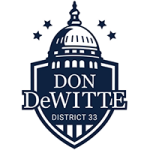 This week Moody’s Investors Service announced that Illinois’ unfunded pension liabilities grew by 19% last year and now stand at a staggering $317 billion. Just one year ago the liability stood at $261 billion. Today’s annual pension payments represent a full 25% of the state’s budget, and the Illinois combined pension liabilities are the highest of any state in the nation.
This week Moody’s Investors Service announced that Illinois’ unfunded pension liabilities grew by 19% last year and now stand at a staggering $317 billion. Just one year ago the liability stood at $261 billion. Today’s annual pension payments represent a full 25% of the state’s budget, and the Illinois combined pension liabilities are the highest of any state in the nation.
Shortly after taking my seat in the Senate, I formally declined to participate in the General Assembly Retirement System. In addition to rejecting my own pension, this year I am championing two bills that would go far in helping to stabilize these unsustainable pension systems:
SB 2525: Amends the General Assembly and Judges Articles of the Illinois Pension Code by closing those pension systems to new participants.
SB 2526: Amends the General Assembly, State Employees, State Universities, Downstate Teachers, and Judges Articles of the Illinois Pension Code by requiring each system to prepare and implement a defined contribution plan by July 1, 2023.
As the business community continues to struggle from financial losses tied to the health pandemic, I am also sponsoring legislation this year that would give these job creators a reprieve from the minimum wage hike that is currently being phased in across the state. The initial restaurant and business shut-downs and subsequent capacity limits caused by the COVID-19 response caused many of our business owners to shut their doors for good, and those who remain are hanging on by a thread. Despite sustaining record losses in 2020, our job creators were greeted in 2021 with a mandated $1 per hour hike to the wage they had to pay their lower-income workers. My new legislation (SB 2268) would push back the ramp for implementation of the minimum wage increase by one full year. Learn more about this legislation here.
Senate Republicans work with health departments on vaccine rollout
For months, Senate Republicans have called on the Pritzker Administration for more inclusion of the legislature in all aspects of the COVID-19 pandemic response, including the state’s COVID-19 vaccination rollout. Seeking a solution, and acting on a suggestion by the Governor, over the past several weeks, Senators have been in contact with local health departments, including a Zoom meeting last week with more than 40 county officials. Together, we worked to identify the major issues they are experiencing in getting vaccinations to their residents.
Based on local feedback, the Caucus produced a report outlining the biggest issues and suggestions from the local health departments. On March 4, Senate Republican Leader Dan McConchie (Hawthorn Woods) and Deputy Republican Leader Sue Rezin (Morris) sent the report to the Governor, along with a letter asking Pritzker to consider the suggestions and begin to collaborate with local officials and lawmakers to make the vaccine rollout work for all Illinoisans.
The report comes at the same time that a large vaccine clinic opens up in Chicago at the United Center. A critical shortage of vaccine supply remains a key problem with delivering vaccines to the collar counties, making it increasingly difficult for seniors and those who qualify under the Phase 1b vaccine plan to secure an appointment and receive a vaccine. Illinois seniors can schedule appointments for a vaccine at the United Center through the Zocdoc web site Zocdoc.com/vaccine or by calling 312-746-4835 (phone lines open 8 am- 8 pm, Monday-Saturday).
Restaurants, retailers oppose budget provision
On behalf of the restaurants, retailers and businesses in the 33rd Senate District, I’m speaking out against a specific component of Gov. Pritzker’s Fiscal Year 2022 budget proposal.
In his budget plan, the Governor recommends reducing the Retail Discount, a critical mechanism in place that only partially reimburses our business community for collecting and transferring Illinois’ sales tax on behalf of state and local government.
What the Governor has carelessly labeled as a “corporate loophole” is actually the business community’s way of attempting to recoup just some of the costs they incur from administering and remitting the sales tax required by law. In fact, according to the Illinois Restaurant Association, every time a consumer uses an electronic form of payment, retailers must pay a processing fee of 2.25 percent plus ten cents to credit card companies. Meanwhile, the retail discount only covers 1.75 percent of that total cost. The numbers are clear, businesses are already taking a financial hit from providing services on behalf of the state.
A point of further concern is the fact that this is not the first time his Administration has attempted to make changes to Illinois’ retail discount. In 2019, an even more aggressive attempt to eliminate the retail discount was proposed under Gov. Pritzker’s leadership.
Senate Republicans argue that government-imposed shutdowns have decimated the business community, and the state should be helping create a landscape for them to rebuild rather than adding to their cost burdens. Now is the worst possible time for state government to further financially devastate the job creators of this state who are already struggling to survive and recover.
Lawmakers urge Governor to veto prejudgment interest bill
Speaking on behalf of the business and medical communities in their districts, several Republican Senators asked Gov. Pritzker this week to veto the prejudgment interest bill that was passed during the waning hours of the “lame-duck” session in January.
House Bill 3360 allows plaintiffs who win a personal injury or wrongful death case in court to be paid their judgment PLUS an additional nine percent interest on judgment dating from the time the defendant first learned of the injury.
If signed into law, House Bill 3360 would require the payment of prejudgment interest for costs that have not yet occurred and are not yet known, requiring employers to pay interest that could go back years. Meanwhile, the proposed measure would drive up healthcare costs at a time when medical providers are already overwhelmed and deter physicians from working in the state.
The Senators noted that businesses and medical providers are still reeling from the COVID-19 pandemic and the subsequent statewide shutdowns Gov. Pritzker unilaterally imposed on the state. As they are working to get back on their feet, Illinois’ job creators and the healthcare industry cannot afford to have any new cost burdens placed on their shoulders, which would only further hamper their recovery. HB 3360 was sent to the Governor on Feb. 4.

